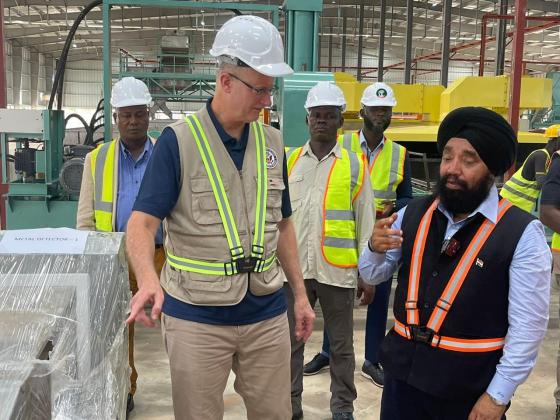Liberia: US Ambassador Says Jeety’s US$25M Factory ‘Good for Liberia’

Amb. McCarthy (left) and Dr. Sachdeva having a chat inside of the factory production area, while inspecting equipment.
…..“The investment is a visual of how this country can be turned around. Everyone agrees that what this country really needs to move forward is foreign investment and this is a perfect example,” Sachdeva says.
US Ambassador, Michael McCarthy, says the US$25 million Jeety Rubber Factory would expand the Liberian economy, while having a profound impact on the host community.
The factory, which is owned by Indian business tycoon Upjit Singh Sachdeva, will be the first in Liberia to add value to the cultivation of rubber, a hugely important commodity for the country’s economy, which currently exports raw product to other nations for processing.
“The investment is a visual of how this country can be turned around. Everyone agrees that what this country really needs to move forward is foreign investment and this is a perfect example,” Sachdeva says.
“[This] is the kind of investment that multiplies. I think this is a wonderful example of what could happen [if] more barriers will be removed from foreign investments.”
McCarthy believes that the factory, which is still under construction, will have a positive impact on the host community by providing much-needed jobs, and much needed skills for the Liberian workforce.
The construction of the factory comes at a time when Liberia is looking to diversify its economy, reducing its dependence on a small number of export industries.
The investment will help drive this diversification, making important inroads into Liberia’s burgeoning manufacturing sector. According to experts, the factory would serve as a catalyst for further investment in the country, building upon existing successes and encouraging a wave of new developments.
“Though the company is yet to produce a finished rubber product at its facility, it has already started to positively impact the lives of citizens and the local economy,” the US envoy noted.
“[Sachdeva] is a good example of many things. One is civic volunteerism. He has done some things as a volunteer like feeding the prisons, supporting industries and citizens for the greater society. Coming here today is another example of what can happen if you allow investors to come in and put some money into the land and into the people.”
McCarthy observed that the investment carried out by Sachdeva, who has stayed many decades in Liberia, showcases his trust and confidence in the country, which makes him feel “comfortable to invest his money.”
The US envoy noted that Sachdeva, who is a former Honorary Consul General of India, has been very ambitious to establish the company in the country.
McCarthy has also called on the Liberian government to provide visas to foreign investors upon their arrival in the country to encourage foreign-direct investment.
He suggested that Liberian visas can be sold at the airport to Western and American investors upon their arrival at a higher price than their actual value to boost the country’s economy.
McCarthy emphasized the importance of foreign investment in Liberia’s economy and infrastructure and called for the avoidance of “uncontrolled risks” to attract more investment. These risks often arise when investors are unable to trust the justice system or contracts in a society or if they cannot secure land for their investments.
“There are easy things that can be done to bring more investors. For instance, American and Western businesses can get visas at the airport, even twice the price when applying for a visa, would make more investors come to Liberia,” the US Ambassador said.
“[The other thing is] risk. The more risks, the more the investors will stay away but if more barriers are removed, would encourage foreign-direct investments in the Liberian economy.
“This is one of the easiest things to drive the Liberian economy. In the case of Sachdeva, he lived in Liberia for many years and was able to scope out the situation and figure out this project. It’s less risky for him, in fact, because he knows the laws of the land. The construction of the company is an investment of the future for post-conflict nation.’’
Meanwhile, Sachdeva has described the construction of the factory as his way of fulfilling his ambition to improve the Liberian economy and providing hundreds of jobs for citizens.
The workforce of the company is made up of 85% of Weala citizens, while the remaining 15% is from other parts of the country.
“I believe that by God’s blessings we will be starting hopefully in July and citizens of Weala are the ones that I will look to first for employment,” Sachdeva says. “I have the full support of every department of the government; they are supporting me wholeheartedly so I can start this thing. We are not planting any tree; we will buy rubber from every farmer in this country.”
